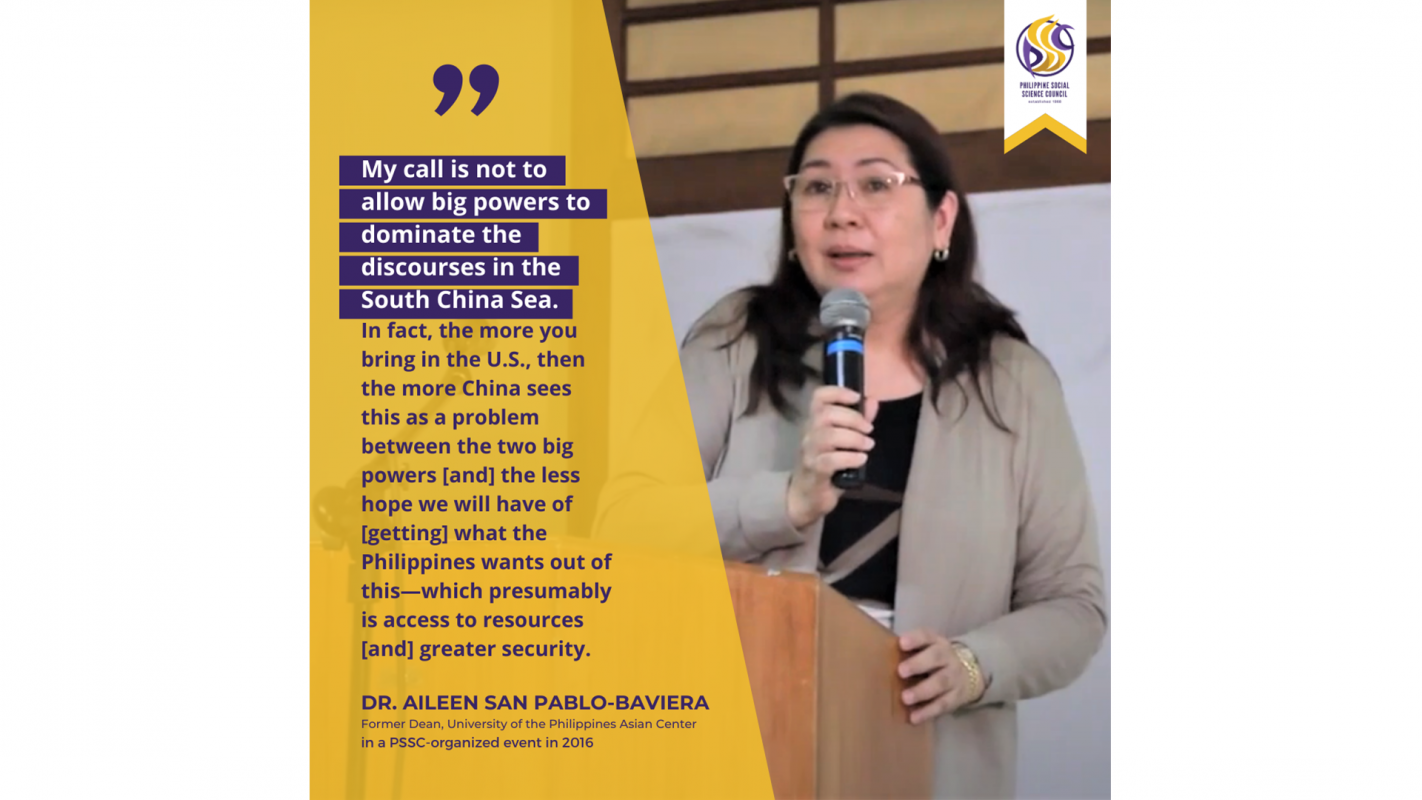Lecture on Geopolitical Quandaries in the South China Sea by Dr. Aileen Baviera
- Posted on

In an event organized by the Philippine Social Science Council in 2016, the late Dr. Aileen San Pablo-Baviera, former Dean of the University of the Philippines Asian Center, delivered this three-part lecture on geopolitical quandaries in the South China Sea.
She began by emphasizing that the West Philippine Sea, far from being an isolated body of ocean, is “part of a broader regional environment”—the South China Sea, which Dr. Baviera described as “a complex security environment with several layers of intersecting challenges, of which rivalry between [the] U.S. and China may be the most challenging.” Apart from territorial disputes, she cited overlapping maritime rights, challenges involving the management of resources, and geopolitical competition among major powers as some of the most pressing issues in the region.
In the second part of her lecture, Dr. Baviera delved deeper into the assertiveness of China and the corresponding attempt to restore balance on the part of the U.S.—both actions, she explained, are driven by their own geopolitical interests. She also pointed out that while China is eager to play a leadership role and decrease U.S. influence in the region, its assertiveness and encroachment on the territories of neighboring states may have the opposite effect of making U.S. influence appear more valuable to those seeking an ally.
As explained by Dr. Baviera below, however, some quandaries related to the lack of resources, the instability of alliances, and contradicting regional policies temper the actions of the two major powers.
The last part of the lecture tackled the Philippines’ own quandaries, including the balancing of principle and pragmaticism in foreign policy, the reliance on a partnership with dubious legitimacy, and the disconnect between exclusivist rhetoric and the reality that the country is incapable of developing the disputed resources on its own.
To conclude, Dr. Baviera laid out courses of action that China, the U.S., and the Philippines may take in order to reach mutually beneficial outcomes and avoid the worst-case scenario.
In an event organized by the Philippine Social Science Council in 2016, the late Dr. Aileen San Pablo-Baviera, former Dean of the University of the Philippines Asian Center, delivered this three-part lecture on geopolitical quandaries in the South China Sea.
She began by emphasizing that the West Philippine Sea, far from being an isolated body of ocean, is “part of a broader regional environment”—the South China Sea, which Dr. Baviera described as “a complex security environment with several layers of intersecting challenges, of which rivalry between [the] U.S. and China may be the most challenging.” Apart from territorial disputes, she cited overlapping maritime rights, challenges involving the management of resources, and geopolitical competition among major powers as some of the most pressing issues in the region.
In the second part of her lecture, Dr. Baviera delved deeper into the assertiveness of China and the corresponding attempt to restore balance on the part of the U.S.—both actions, she explained, are driven by their own geopolitical interests. She also pointed out that while China is eager to play a leadership role and decrease U.S. influence in the region, its assertiveness and encroachment on the territories of neighboring states may have the opposite effect of making U.S. influence appear more valuable to those seeking an ally.
As explained by Dr. Baviera below, however, some quandaries related to the lack of resources, the instability of alliances, and contradicting regional policies temper the actions of the two major powers.
The last part of the lecture tackled the Philippines’ own quandaries, including the balancing of principle and pragmaticism in foreign policy, the reliance on a partnership with dubious legitimacy, and the disconnect between exclusivist rhetoric and the reality that the country is incapable of developing the disputed resources on its own.
To conclude, Dr. Baviera laid out courses of action that China, the U.S., and the Philippines may take in order to reach mutually beneficial outcomes and avoid the worst-case scenario.
In an event organized by the Philippine Social Science Council in 2016, the late Dr. Aileen San Pablo-Baviera, former Dean of the University of the Philippines Asian Center, delivered this three-part lecture on geopolitical quandaries in the South China Sea.
She began by emphasizing that the West Philippine Sea, far from being an isolated body of ocean, is “part of a broader regional environment”—the South China Sea, which Dr. Baviera described as “a complex security environment with several layers of intersecting challenges, of which rivalry between [the] U.S. and China may be the most challenging.” Apart from territorial disputes, she cited overlapping maritime rights, challenges involving the management of resources, and geopolitical competition among major powers as some of the most pressing issues in the region.
In the second part of her lecture, Dr. Baviera delved deeper into the assertiveness of China and the corresponding attempt to restore balance on the part of the U.S.—both actions, she explained, are driven by their own geopolitical interests. She also pointed out that while China is eager to play a leadership role and decrease U.S. influence in the region, its assertiveness and encroachment on the territories of neighboring states may have the opposite effect of making U.S. influence appear more valuable to those seeking an ally.
As explained by Dr. Baviera below, however, some quandaries related to the lack of resources, the instability of alliances, and contradicting regional policies temper the actions of the two major powers.
The last part of the lecture tackled the Philippines’ own quandaries, including the balancing of principle and pragmaticism in foreign policy, the reliance on a partnership with dubious legitimacy, and the disconnect between exclusivist rhetoric and the reality that the country is incapable of developing the disputed resources on its own.
To conclude, Dr. Baviera laid out courses of action that China, the U.S., and the Philippines may take in order to reach mutually beneficial outcomes and avoid the worst-case scenario.
